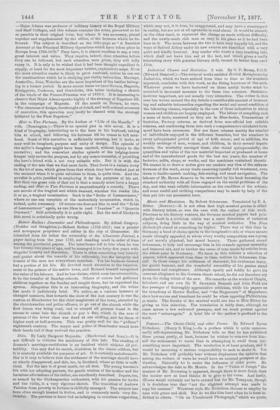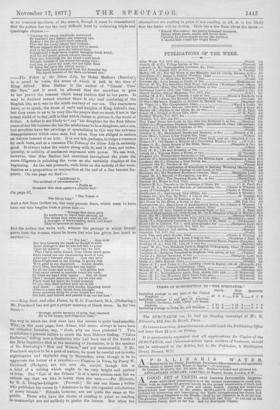POETRY.—The Christ - Child, and other Poems. By Edward Byron Nicholson, (Henry
S. King.)—In a preface which is quite unneces- sarily self-depreciating, Mr. Nicholson tolls us that he has published these poems, partly, at least, because he wishes to remove from him- self the enticement to waste time in attempting to swell them into something more important. The resolution is at least prudent, and it would be incurring a serious responsibility to seek to shako it. Yet Mr. Nicholson will probably hear without displeasure the opinion that among the writers of verse he would have an unusual prospect of dis- tioction. Naturally he is under the influence of older poets. He acknowledges the debt to Mr. Morris. In the " Vision of Joseph " the manner of Mr. Browning is apparent, though there is more finish than the master now at least thinks fit to give to his verse. And lastly, Tnone would certainly not have existed but for Mr. Tennyson, though it is doubtless true that "not the slightest attempt was made to copy his manner." Whatever style Mr. Nicholson chooses to employ ho uses with grace and skill. Nor do we like him least when ho is least in- debted to others. " On an Uncoloured Photograph," which wo quote, is no common specimen of the sonnet, though it must be remembered that the author has out the very difficult knot by eschewing triple and quadruple rhymes :—
4. Viewing thy sweet similitude, portrayed By heaven's own limner, the unerring sun, Rudely I did the artist's fault upbraid. That left his lovely labour half undone ; Whose niggard sloth of my poor wit to mend, .And to his picture give thy natural hues, Straightway I bade three courier thoughts forth wend, And for my pencil purest colours choose. Then one, returning, for thy cheek's soft blush Brought vaned' of the winter-blooming rose ; And ono, to paint thy neck, the last taint Hush Of dying day upon the winter snows; The third had borrowed from the dawning eky
The liquid heaven of thy dark-curtained eye: —The Token of Me Silver Lily, by Helen Blathers (Bentley), is a novel in verse, the scene of which is laid in the time of King Alfred. Miss Mather is the author of " Comin' Thro' the Rye," and it must be allowed that she contrives to give to her poetry the interest which many readers find in her prose. It may be doubted indeed whether there is any real rendering of the English life, as it was in the ninth century of our era. The diameters have, so to speak, the dress of earls and knights of King Alfred's day, but they seem to us to be very like the people that we meet, if not in the actual world of to-day, still in that which claims to picture it, the world of fiction. A father is not likely to " cut " his daughter for the first fifteen years of her life because she has the misfortune to be a daughter, not a son, 'but novelists have the privilege of symbolising in this way the extreme disappointment which some mon feel when they are obliged to endure an heiress instead of an heir. It is not fair, perhaps, to judge a romance by such testa, and as a romance The Token of the Silver Lily is certainly good. It always takes the reader along with it, and it rises, not unfre- -quently, to nobility of sentiment expressed with power. We can wish, however, that Miss Mather had exercised throughout the poem the same diligence in polishing the verse as she certainly displays at the beginning. As the tale proceeds, such blots on the melody of the versi- fication as a preposition or conjunction at the end of a line become fre- quent. On one page we find :—
“Indifferent to The accident of circumstances;" " Futile as Breakere that dash against a granite wall."
On page 57,
The Silver Lily," "The Token of And a few lines further on, the very prosaic linos, which seem to have been out into lengths from a prose tale :—
Strange that these girls So ready are to leave their parents, all The things they value and are used to, for A stranger, of whose habits, mind, and heart They're ignorant as babes."
But the author can write well, witness the passage in which Harold parts from the woman whom he loves, but who has given her heart to another For her,'. . . then took Her face between his hands as though it were Some stranger's that he was full fain to print Upon his memory... '01 rare lips,' ho said, That I have never kissed, from whose sweet gates Have issued not one stammering word of love, Although I listened always... eyes that ne'or Have brightened at my coming, or grown dim With grief at my departure. . . tender cheeks, Twin lilies, that have worn but one asphet To all my looks and words. . . soft golden hair That never twined in tendrils round my neck, Or filled my hand with beauty... Yea, all these That I thought mine are his yet no man can Pluck from my heart the lovely memory Of you, that shall endure with me in life And death.' . and so with tender, lingering touch (Like to a man who layeth from his sight Some pricelese thing for ever) loosed her from His hold, and turned, and passed from out her ken."
--- King Soul, and other Poems, by E. G. Punchard, M.A. (Pickering.) Mr. Punchard has not got a proper mastery of blank verso. In the two lines,—
" Strange, subtle mastery of sobs, that charmed 110 in the happy, half-forgotten time;"
the way in which the first runs into the second is quite inadmissible. Why, on the next page, does Abner, who seems always to have been an orthodox Israelite, say, " Gods, pity mo thus pinioned "? This symbolises a general failure to catch the true Hebrew feeling. " Caine Barbatus," telling how a Centurion who had been one of the watch at the Holy Sepulchre died at the storming of Jerusalem, is in the manner of Mr. Browning's " Men and Women," and not unsuccessful. If Mr, Punchard aspires to be a poet of nature, ho must be careful not to make nightingales and skylarks sing in November, even though it bo to aggravate the horror of a murder.--- Ventures in Verse, by Percy W. Oruttwell (Hodges), are fair vers des societe; though this is a kind of a writing which ought to be very bright and perfect .of form. The "Tale of the Crimea" is of a more serious cast, but we 'cannot say that we like it better than the rest...---Pel Moments, by R. A. Douglas-Lithgow. (Provost.) No one can blame a writer who publishes his verses in " deference to the oft-repeated solicitations of many friends." Friends, however, are not quite the same as the public. Those who have the choice of reading in print or reading in manuscript are not unlikely to prefer the former. But when the alternatives are reading in print or not rending at all, it is too likely that the latter will be chosen. Here are a few lines about the moon :- "Behold, She comes 1 the pearly-bosomed monarch, Before whom poets, saints, and lover, bow; Ilphorne by sliver clouds across the heavens, A sacred halo round her virgin brow."







































 Previous page
Previous page